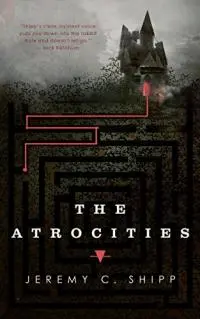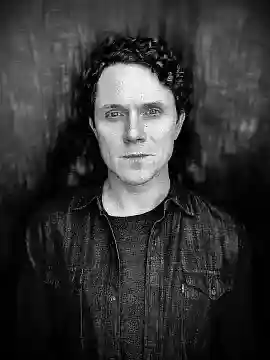Photo courtesy of the author
Jeremy C. Shipp is the Bram Stoker and Shirley Jackson Award-nominated author of The Atrocities, Bedfellow, and Cursed. Their shorter tales have appeared in over 60 publications, including Cemetery Dance and Apex Magazine. Jeremy lives in Southern California in a moderately haunted Farmhouse. Their twitter handle is @JeremyCShipp.
Do you have a writing routine? Daily word/page count? A specific place where you write?
In the halcyon days before the pandemic, I would dress to the nines in hamburger-print shorts and a Mac & Me t-shirt and I would write at the library, submerged in that swirling, otherworldly energy emanating from the books and the people who love books. I remember gazing thoughtfully out of windows, at flitting milkweed butterflies and dust-bathing ground squirrels. Sometimes, I would write at a coffee shop and treat myself to an Arnold Palmer and a gluten-free doughnut that tastes surprisingly foodlike. At that time, the coffee shop had a semi-quiet room in the back, away from the cacophony of vibrant voices and clinking cups, semi-perfect for writers and artists who wanted to get some work done.
Nowadays, when I need to write, I slither my way under the floorboards of our tiny farmhouse and curl up in my hollow. I write on Wendy’s napkins with nothing to keep me company but human-faced spiders and spider-faced mannequins. I may be exaggerating things a little.
I don’t set word or page count goals for myself, because what I can manage to write varies so much from day to day. So I set time goals for myself. If I can write for four or five hours in a sitting, I’m happy, no matter how many words I manage to siphon from my brain.
Your two most recent books were horror stories. When writing those did you start with a concept, a character, or did the ideas arrive fully formed?
For The Atrocities, I wanted to write a modern-day ghost story where I could turn certain gothic tropes on their heads. Everything burgeoned forth from that initial goal. I also knew from the beginning that I wanted to construct a grotesquely beautiful and beautifully grotesque house that would be as important to the story as the characters.
As for Bedfellow, my inceptive desire was to create a unique monster. His personality and his abilities formed in my mind first, and the members of the Lund family soon followed.
It’s strange. Despite the fact that my starting point for a book is often a concept, the concept is not what keeps me writing a story. It’s the characters who motivate me to move forward. They’re the heart.
As a reader, what do you look for the most in a horror book?
I love atmospheric slow burns. I love vivid, dazzling, poetic prose. I love the spellbinding tension that exists between the rational and the uncanny. I love horror with a heart, where kindness doesn’t take a back seat to the terrors. I love monsters and ghosts and transformations. A creepy ventriloquist dummy is always a lot of fun as well.
What does your editing process look like? Do you edit as you go, or finish a first draft and then go back over it from start to finish? Or...something completely different?
I edit as I go, in the sense that I overly obsess over every sentence. I’ll write and rewrite and rewrite a sentence until I’m happy with it, and then a year later, when I’m “finished” with the book, I’ll read over that sentence again and find that I’m not so happy with that damned sentence after all, so I’ll rewrite it again. The writing process, for me, is frustrating and horrible and utterly engrossing and gratifying.
After you finish a book or story, do you have trusted beta readers? If so, how do they help shape what will be the final version?
The spider-faced mannequins under the floorboards like to read over my shoulders as I’m writing, which can make me feel somewhat self-conscious. I’m also lucky enough to have some non-eldritch loved ones who read many of my books and stories before I send them out into the wide, wide world. As I mentioned, I tend to obsess over every sentence, and so I don’t change anything too drastically once I’m happy with what I’ve crafted. But my loved ones will help to point out if part of a story is unintentionally confusing. I am more than happy to write something that is intentionally confusing, but if I’m trying to be clear, I want to be clear.
Who are some of the writers who have most influenced you?
As a kid, I read a lot of H.G. Wells, Jules Verne, Ray Bradbury. They helped me fall in love with speculative fiction. These days, I also find myself inspired and influenced by writers such as Charlotte Brontë, Shirley Jackson, Daphne du Maurier, Kurt Vonnegut, William Peter Blatty, Junji Ito, Alice Walker, Susan Hill, Sylvia Plath, Arundhati Roy, Toni Morrison, Kazuo Ishiguro, Ira Levin, Richard Matheson, Robert Marasco, John Ajvide Lindqvist. The list goes on and on, but I suppose I shouldn’t go on for eternity.
What is a book you love you feel hasn't gotten enough attention?
Through the Woods by Emily Carroll is one of the best comic collections I’ve ever read. These are quiet, subtle, haunting tales. I’d also like to recommend Taaqtumi: An Anthology of Arctic Horror Stories. This anthology is made up of nine masterfully-crafted tales by indigenous and non-indigenous writers from the Arctic. Horror fans who haven’t yet read Through the Woods or Taaqtumi should rectify that post haste.
What is your personal goal when writing a horror story/book? Is it to scare the reader, or is it something else more than chills and thrills?
Every book is different. But overall, I want to transport my readers to realms simultaneously peculiar and familiar. I want my readers to experience both fear and hope. For me, a horror story allows us to not only shine a light on evil, but on kindness and love and wonderment and everything that allows us to keep fighting the good fight.
I want to write the strange little stories that only I can write, and if these stories connect meaningfully with some readers, then I’m happy. “It feels as if this book is written for me,” they might say. And yes, it is.
What can you tell us about your new novel coming from Meerkat Press?
 Here’s a small smackerel of details:
Here’s a small smackerel of details:
In The Merry Dredgers, we will follow Seraphina Ramon into a once-abandoned amusement park now populated by a community of cultists. To our left, a dragon-themed roller coaster rests on the blackened earth, curled up like a dead snake. To our right, an animatronic Humpty Dumpty falls off a concrete castle and shatters on the ground, only to reform itself moments later. Up ahead, cultists giggle as they meditate in a hall of cracked mirrors. This is the last place in the world Seraphina wants to be, but at the same time, she will stop at nothing to investigate the cult that almost killed her sister. And the best way to find out the truth about this bizarre cult is to join them.
I’m still working on the book, so to any fan of mine reading this, please go on Twitter and tell me to stop posting about sporks and The Star Wars Holiday Special and to get back to writing.
Can you think of a story you've written that got under your skin, made you feel uncomfortable while writing it?
To be honest, I creep myself out fairly often. I’m sensitive. Sometimes I can’t write at night.
When I was writing The Atrocities, Stockton House became so detailed and vivid in my mind that sometimes I felt as if I were wandering the halls myself, studying the grotesqueries, discovering new rooms and new secrets. I can still feel my mind drifting back there at times, like a confused moth to the painting of a flame.
What do you try to do at a sentence level with your stories? As you know, some writers try to make every sentence as perfect/beautiful as it can be. Others focus more on the paragraph, on the overall feel of what's happening in the story. Others try to make things as clear as possible. I'm just curious what you're working toward as you write the individual sentences that end up making the story.
This might be difficult to put into words, but I approach each sentence as a multifaceted and complex piece of the larger story. Various facets of each sentence are important to me, simultaneously. I care about the rhythm and the language and the vividness of a sentence. At the same time, I care about what I’m revealing about the characters or the plot. At the same time, I care about provoking emotions or thoughts or some sensation that exists in between.
Most importantly, when I approach a sentence, I try to create something that is interesting to me in one way or another. If I’m not interested in what I’m crafting, then I’m sure my readers won’t be interested either.
Who are some of the writers working right now whose work you really enjoy?
There is such an ocean of talent out there. Right now I’m reading Little, Big by John Crowley, and The Fisherman by John Langan. They’re both blowing me away. Last year, some books by working writers I enjoyed are The Cipher by Kathe Koja and The Ballad of Black Tom by Victor LaValle. I also read through every Parasyte book by Hitoshi Iwaaki, and it was a lovely, bizarre experience. Some books on my TBR list I’m looking forward to reading are Anoka by Shane Hawk and Coyote Songs by Gabino Iglesias. My TBR pile is stacked to the stars, because there are so many brilliant writers out there, but I’ll get through the literary monolith eventually. That’s what I tell myself anyway.
Get The Atrocities at Bookshop or Amazon

About the author
Tyler Jones is the author of Criterium, The Dark Side of the Room, Almost Ruth, Burn the Plans (one of Esquire's “Best Horror Books of 2022”), Heavy Oceans, and Midas.
His work has appeared in numerous magazines and anthologies including Cemetery Dance, LitReactor, PseudoPod, Tales to Terrify, and The NoSleep Podcast.
He lives in Portland, Oregon.








